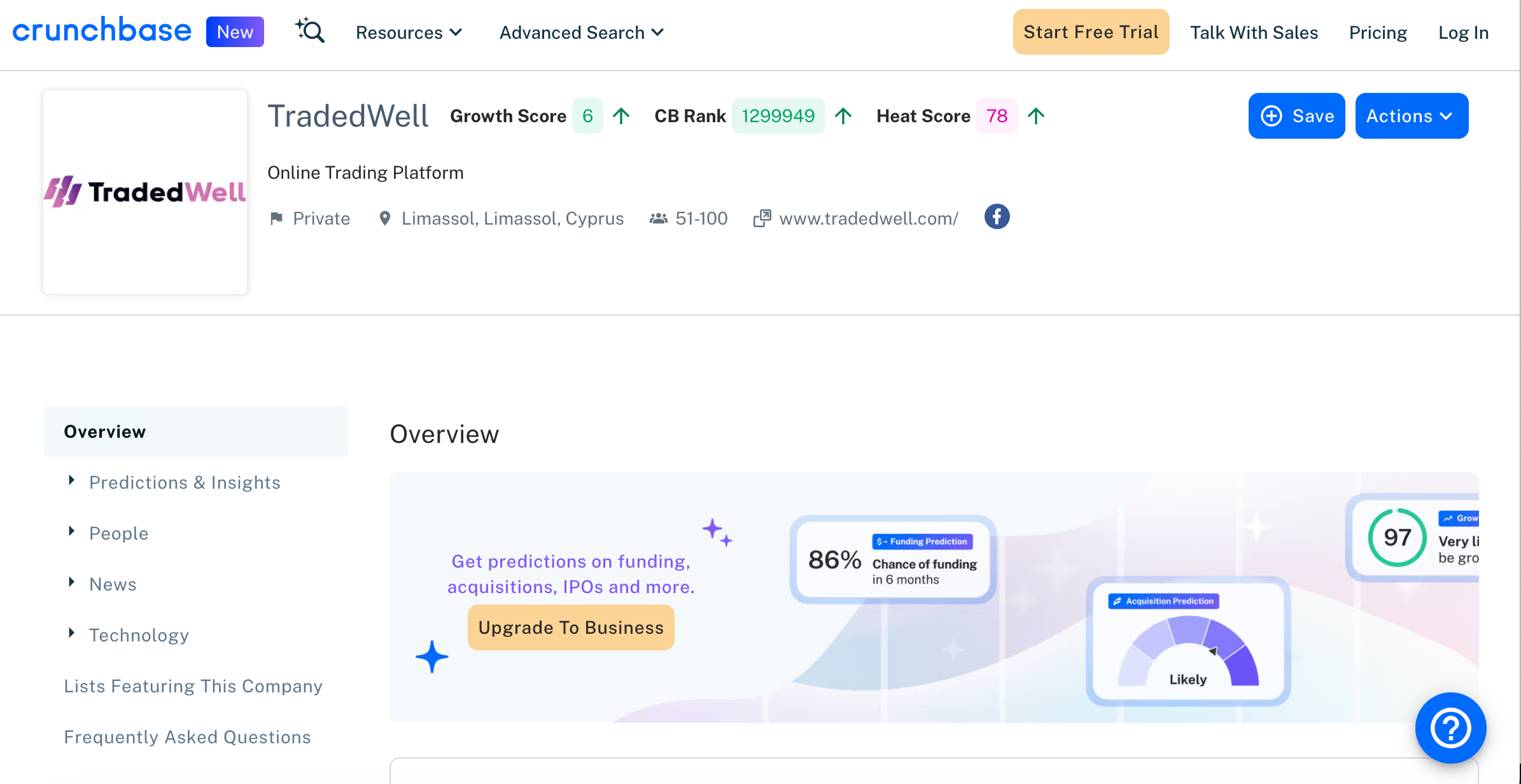TradeDwell.com Scam Review – A Deep Look
In the world of online trading and investment, numerous brokers promise large returns, expert support and slick trading platforms. Yet, behind many of these facades lie serious red flags and patterns of misconduct. One broker under scrutiny is TradeDwell.com (also referenced as TradedWell.com). While it presents itself as a legitimate Forex/CFD provider, a closer inspection reveals troubling issues: questionable practices, withdrawal difficulties, and regulatory troubles. This review explores how TradeDwell.com operates, its warning signs, and why investors need to proceed with extreme caution.
What TradeDwell.com Claims to Offer
On its surface, TradeDwell.com presents as a full-service brokerage offering access to Forex, CFDs, cryptocurrencies, stocks, indices and more. The site boasts multiple account types and platforms (WebTrader, MetaTrader, mobile apps), high leverage options, and promises of professional account management. Marketing materials emphasise “global clients”, “trading made simple” and “maximising your returns”.
Such messaging is designed to appeal to both new and experienced traders looking for opportunity. And on the surface, the website appears professional — dashboards, asset tables, promotional banners. But appearances can be deceiving.
Major Red Flags Identified
1. Inconsistent Regulatory Claims & Licensing Issues
At first glance, TradeDwell.com asserts regulatory oversight (for example by a Cyprus regulator) via a parent company. However, reviews reveal serious issues: although the parent company is purportedly licensed, the broker appears to have misaligned practices (such as poor disclosures, high fees, odd terms). In one report, the website for the broker was closed down in January 2023 with only a notice that it was “undergoing operational optimization” — a notice many victims see when access is being cut off. In effect, the broker no longer accepts new clients or processes new trades in the way originally advertised.
When a broker stops accepting new trades, halts deposits or withdrawals and issues a vague notice of “optimization”, this often signals that the firm has collapsed, is exiting the market or shifting operations in a way that leaves client funds at risk.
2. Poor Trading Conditions, Hidden Costs & Unfair Clauses
Independent reviews of TradeDwell show that spreads and conditions were far from competitive. For example, major currency pairs were quoted with spreads much higher than industry norms. Additional costs or punitive clauses were found, including large inactivity fees and complicated withdrawal terms. In one review, a broker working under the same entity required a minimum trade volume or placed a “fee” for withdrawing small amounts.
These practices are characteristic of brokers that structure their terms so that the client struggles to extract value or withdraw profits.
3. Poor Transparency About Ownership, Terms & Withdrawal Policies
TradeDwell.com and its associated company present vague details regarding corporate structure, beneficial ownership, physical offices and client fund segregation. Some legal documents are present, but reviewers identified clauses that allow the broker wide latitude (for example, to charge arbitrary “admin fees” or suspend accounts for inactivity without clear definition).
Furthermore, withdrawal complaints are high: clients report being told they must make many trades, upgrade their account, or deposit further funds before any withdrawal is approved.
4. Reports from Real Clients of Withdrawal Refusal & Aggressive Sales
Multiple client testimonials present a consistent story: initial deposits are made, small profits may appear on the dashboard, then when withdrawal is attempted the broker issues excuses — “you need to trade more”, “you have to reach a volume threshold”, “you must upgrade your account”. In some cases the site closes or becomes inaccessible after the broker stops allowing new trades. On review platforms the broker’s score is very low (e.g., under 2 stars in many cases), with many complaints of high-pressure sales tactics, large losses and inability to withdraw.
5. Sudden Shutdown, Domain/Brand Change, and Regulatory Sanctions
In one report, the broker’s website was shut down in January 2023 for “operational optimization” after the parent firm was fined a significant amount by the regulator for violations. That combination – regulatory trouble, website shut-off and client complaints – is a classic sequence for a broker exiting the market uncomfortably, leaving clients with unresolved funds.
How the Typical “TradeDwell” Experience Goes
Based on user reports and the pattern described above, the lifecycle of a TradeDwell.com account may be:
-
Initial Attraction & Deposit
The trader sees an advertisement or referral. They register, deposit a moderate sum (€200–€500 or equivalent) and begin trading (or are encouraged to let “experts trade for them”). -
Initial Gains & Trust Building
The dashboard may show profits, the account manager is friendly, suggests upgrades. This builds trust and encourages the investor to deposit more money, move to a “premium” tier or increase volume. -
Pressure & Additional Deposit Requests
The account manager calls, chats, pushes for more funds (“if you deposit now you’ll get better returns”, “VIP packages”, “exclusive offer”). The client often agrees, trusting the earlier “profit”. -
Withdrawal Attempt & Barriers
The investor tries to withdraw either initial deposit or profits. Then requirement appears: “You must trade X times”, “You must upgrade your account”, “You must pay processing/admin fees” — all unspecified or excessive. Some clients are told they must deposit more before the withdrawal can proceed. -
Access Declines or Site shuts Down
The website becomes inaccessible, customer service disappears, the company issues a vague notice of “optimization”. At this point, client funds are hard to access or gone entirely. -
Regulator reaction / Brand ceases
A regulator issues fines or suspends licenses, the brand dissolves or morphs into a new name and domain. Clients are left without clear recourse.
Why This Situation Is Risky for Investors
-
Lack of genuine oversight means there is no guarantee your funds are segregated or protected.
-
Hidden costs and unfair conditions make it hard to withdraw or succeed.
-
Pressure on traders to deposit more exploits emotions rather than sound trading.
-
Shutdowns and brand changes trap client funds in limbo.
-
Anonymous ownership and unclear terms reduce transparency and accountability.
Even if a broker holds a licence, if its practices are opaque or client reports are heavily negative, the licence alone does not guarantee integrity. In the case of TradeDwell.com, regulatory affiliation did not prevent service breakdown and client losses.
Comparison With a Legitimate Broker
| Feature | Legitimate Broker | TradeDwell.com |
|---|---|---|
| Transparent ownership and registration | Clear company details, regulator, license number | Vague ownership, buried terms, sudden shutdown |
| Withdrawal ease and fair conditions | Withdrawals allowed with clear rules, minimal hidden terms | Withdrawal blocked by conditions, forced upgrades, additional deposits |
| Competitive and fair trading costs | Spreads and fees within industry norms, demo account offered | High spreads, no demo, heavy clauses and fees |
| Client fund protection and segregation | Funds kept separate, regulated oversight | No clear proof of fund segregation, reports of losses |
| Customer reviews and track record | Balanced reviews, positive and negative but accountability exists | Numerous negative testimonials, 1-star ratings, complaints of non-payment |
Key Questions to Ask Any Broker (And How TradeDwell.com Fails Them)
Before investing, ask:
-
Are you licensed and regulated by a major authority?
TradeDwell claimed this, but the outcome showed regulatory sanction and shutdown. -
Can I withdraw funds easily, what are the conditions?
With TradeDwell, withdrawal conditions were hidden or changed after deposit. -
Is there full transparency on ownership, office, fees?
TradeDwell lacked clear public information and had client complaints about unclear fees. -
Is marketing realistic and truthful?
TradeDwell used high-pressure sales, “upgrade now” pitches and unrealistic profit promises. -
What happens if the company exits or changes domain?
With tradeDwell the site shut down and clients were left uncertain of where to recoup funds.
If a broker cannot answer these satisfactorily, the risk is very high.
Final Verdict on TradeDwell.com
Based on the evidence — withdrawal obstacles, hidden terms, regulatory trouble, site shutdown, and very poor user feedback — TradeDwell.com (TradedWell.com) appears to operate in a manner consistent with high-risk or fraudulent broker behaviour. While there may have been a legitimate licence initially, the structure of operations, client experiences and regulatory action together suggest that the broker no longer offers a secure or safe trading environment.
Investors who consider using such a platform should be aware that they may face significant risk of loss, inability to withdraw, or total lack of recourse. This makes TradeDwell.com a broker to avoid unless clear, verifiable improvements are made (which currently appear absent).
In a domain where trust, transparency and accountability are vital, TradeDwell.com fails on multiple fronts. The safest assumption for any potential user is that the platform cannot be relied upon to protect investor capital or deliver on promises. Therefore, anyone contemplating deposits should exercise extreme caution — or avoid altogether.
Report TradeDwell.com and Recover Your Funds
If you have fallen victim to TradeDwell.com and lost money, it is crucial to take immediate action. We recommend Report the scam to BOREOAKLTD.COM , a reputable platform dedicated to assisting victims in recovering their stolen funds. The sooner you act, the greater your chances of reclaiming your money and holding these fraudsters accountable.
Scam brokers like TradeDwell.com persistently target unsuspecting investors. To safeguard yourself and others from financial fraud, stay informed, avoid unregulated platforms, and report scams to protect. Your vigilance can make a difference in the fight against financial deception.





